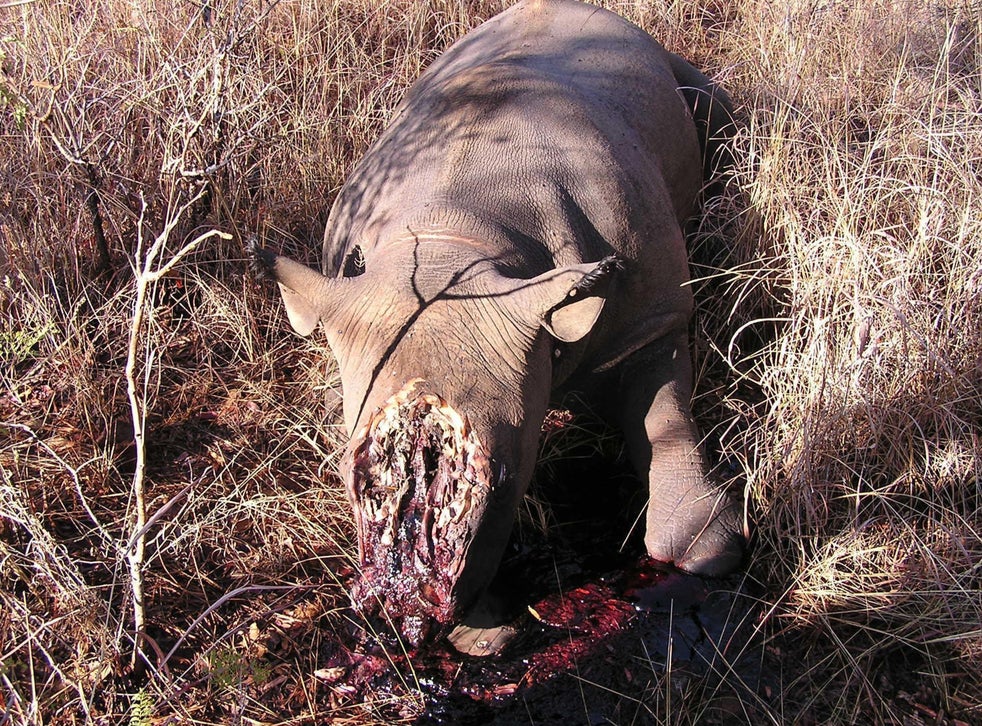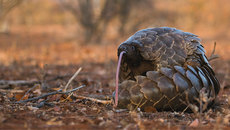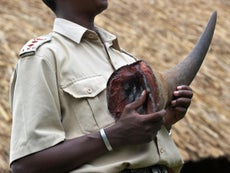We are working with conservation charity Space for Giants to protect wildlife at risk from poachers due to the conservation funding crisis caused by Covid-19. Help is desperately needed to support wildlife rangers, local communities and law enforcement personnel to prevent wildlife crime
Emma Ledger
4 days ago

A poached rhino can be seen in Africa(SaveTheRhinoInternational)
Poachers used a silenced hunting rifle to kill this black rhino for its horn while it drank at a water hole in South Africa.
Around the world, one rhino is killed every 10 hours. To stop this slaughter, either consumer demand for their horn must be eradicated, or poachers must be stopped from killing them. Those are the intractable options.
Charity Save the Rhino is committed to changing how rhino horn is perceived in South East Asia - where most trafficked horn ends up, and where it is prized as a symbol of power and wealth.
However, enacting a cultural change could take decades. That’s too long for some species of rhinoceros, such the Javan and Sumatran, who are on the path to extinction.
With consumer demand unlikely to disappear any time soon, and a black market continuing regardless, the survival of rhinos hinges on innovative strategies to prevent poaching.
Poachers used a silenced hunting rifle to kill this black rhino for its horn while it drank at a water hole in South Africa.
Around the world, one rhino is killed every 10 hours. To stop this slaughter, either consumer demand for their horn must be eradicated, or poachers must be stopped from killing them. Those are the intractable options.
Charity Save the Rhino is committed to changing how rhino horn is perceived in South East Asia - where most trafficked horn ends up, and where it is prized as a symbol of power and wealth.
However, enacting a cultural change could take decades. That’s too long for some species of rhinoceros, such the Javan and Sumatran, who are on the path to extinction.
With consumer demand unlikely to disappear any time soon, and a black market continuing regardless, the survival of rhinos hinges on innovative strategies to prevent poaching.
Why we need to win the war against rhino poachers
One of the most important is what happens inside the courtrooms that trial rhino horn hunters and traffickers.
Shamini Jayanathan is a criminal barrister working in illegal wildlife trafficking in Africa, with a focus on prosecutions. She tells The Independent: “The only way to tackle and deter the killing of rhinos is through the courts. Arrests and seizures of horn represent only a disruption to criminal operations, not an end.”
Ms Jayanathan explains that because the rhino is such a highly protected animal, many African countries rightly have high minimum prison terms for related cases. But as a result, every defendant pleads not guilty, meaning there is no incentive to cooperation. Trials can last years, with hearings delayed or endlessly postponed, running up costs and zapping time and momentum.The Covid-19 conservation crisis has shown the urgency of The Independent’s Stop the Illegal Wildlife Trade campaign, which seeks an international effort to clamp down on illegal trade of wild animals(ESI)
“The biggest enemy to rhino horn cases is delay,” says Ms Jayanathan. “And as the legal maxim attests, justice delayed is justice denied. There is ongoing, vital work in the courts to speed up criminal trial process, to ensure the prosecution case is strong at the start of the case, and that the sentence at the end is proportionate to the crime.
The Independent’s Stop the Illegal Wildlife Trade campaign, which was launched earlier this year, seeks an international effort to clamp down on poaching and the illegal trade of wild animals.
South Africa is home to nearly 80 per cent of the world's remaining rhinos. It has been hit hard by wildlife crime, with more than 1,000 rhinos killed there each year between 2013 and 2017.
In March 2017 the South African government created Skukuza Regional Court close to the edge of one of its most famous nature conservancy, Kruger National Park.
Read more

One of the most important is what happens inside the courtrooms that trial rhino horn hunters and traffickers.
Shamini Jayanathan is a criminal barrister working in illegal wildlife trafficking in Africa, with a focus on prosecutions. She tells The Independent: “The only way to tackle and deter the killing of rhinos is through the courts. Arrests and seizures of horn represent only a disruption to criminal operations, not an end.”
Ms Jayanathan explains that because the rhino is such a highly protected animal, many African countries rightly have high minimum prison terms for related cases. But as a result, every defendant pleads not guilty, meaning there is no incentive to cooperation. Trials can last years, with hearings delayed or endlessly postponed, running up costs and zapping time and momentum.The Covid-19 conservation crisis has shown the urgency of The Independent’s Stop the Illegal Wildlife Trade campaign, which seeks an international effort to clamp down on illegal trade of wild animals(ESI)
“The biggest enemy to rhino horn cases is delay,” says Ms Jayanathan. “And as the legal maxim attests, justice delayed is justice denied. There is ongoing, vital work in the courts to speed up criminal trial process, to ensure the prosecution case is strong at the start of the case, and that the sentence at the end is proportionate to the crime.
The Independent’s Stop the Illegal Wildlife Trade campaign, which was launched earlier this year, seeks an international effort to clamp down on poaching and the illegal trade of wild animals.
South Africa is home to nearly 80 per cent of the world's remaining rhinos. It has been hit hard by wildlife crime, with more than 1,000 rhinos killed there each year between 2013 and 2017.
In March 2017 the South African government created Skukuza Regional Court close to the edge of one of its most famous nature conservancy, Kruger National Park.
Read more

Stop the Illegal Wildlife Trade: How pangolins became the ultimate luxury good
Hailed as a hugely positive step for the effective and swift handling of trials for rhino poachers and traffickers, Skukuza’s two senior prosecutors had backgrounds in organised crime cases and extensive knowledge of wildlife crime-related law.
During its first year, the ‘rhino court’ - as it became known - brought more than 90 poachers to justice, with a 100 percent conviction rate. Prison sentences ranged from 12 to 40 years. Elsewhere in South Africa, fewer than 25 per cent of similar convictions resulted in sentences longer than 10 years, according to Department of Environment, Forestry and Fisheries.
Rhino poaching also declined. Last year in South Africa there was a reported 594 rhinos killed for their horn, down from 769 in 2018. And the data detailing where rhinos were killed suggests that poachers had begun to avoid Kruger to hunt in other provinces - likely deterred by the ‘rhino court’.
However, Skukuza Regional Court has been closed since August last year, amid unexpected plans to move it almost 100km away from Kruger.
Save the Rhino’s Emma Pereira says that moving the court could have dire consequences for rhinos. “Skukuza’s proximity to Kruger is really helpful in terms of rangers being able to quickly get there to give evidence that can help secure convictions. Moving it might mean it would take much longer for a ranger to travel there and back, something many just won’t be able to do."
Activists created a petition to fight the plan, and the Department of Justice and Correctional Services has halted the decision for now, as stakeholders question how the upheaval would benefit rhinos.
Hailed as a hugely positive step for the effective and swift handling of trials for rhino poachers and traffickers, Skukuza’s two senior prosecutors had backgrounds in organised crime cases and extensive knowledge of wildlife crime-related law.
During its first year, the ‘rhino court’ - as it became known - brought more than 90 poachers to justice, with a 100 percent conviction rate. Prison sentences ranged from 12 to 40 years. Elsewhere in South Africa, fewer than 25 per cent of similar convictions resulted in sentences longer than 10 years, according to Department of Environment, Forestry and Fisheries.
Rhino poaching also declined. Last year in South Africa there was a reported 594 rhinos killed for their horn, down from 769 in 2018. And the data detailing where rhinos were killed suggests that poachers had begun to avoid Kruger to hunt in other provinces - likely deterred by the ‘rhino court’.
However, Skukuza Regional Court has been closed since August last year, amid unexpected plans to move it almost 100km away from Kruger.
Save the Rhino’s Emma Pereira says that moving the court could have dire consequences for rhinos. “Skukuza’s proximity to Kruger is really helpful in terms of rangers being able to quickly get there to give evidence that can help secure convictions. Moving it might mean it would take much longer for a ranger to travel there and back, something many just won’t be able to do."
Activists created a petition to fight the plan, and the Department of Justice and Correctional Services has halted the decision for now, as stakeholders question how the upheaval would benefit rhinos.
Leading US investigator into illegal ivory and rhino horn trade stabbed to death in his Kenyan home
Crispin Phiri, spokesperson for the department, says “the court plays an important role in conserving our environment in so far as rhino poaching is concerned”, and confirmed “a moratorium to get a proper briefing on what the understanding is and the motivation for moving the court”.
Most working in wildlife crime agree that Skukuza is a model that works, and one that needs replicating in countries that have a population of rhino, or act as trafficking transit corridors.
To protect rhinos and other wildlife at risk from poachers, The Independent is working with Space for Giants, a conservation charity that has extensive expertise in strengthening the judicial and conservation authorities in six African countries.
Between 2016 and 2020 Ms Jayanathan led Space for Giants' team of legal professionals training prosecutors, investigators and magistrates so trials run smoother and legal processes are more effective. She says: “In Kenya - where we collaborated with prosecution services and the judiciary, Kenya Wildlife Service and other partners - we have seen a steady rate of convictions of wildlife criminals, including rhino horn traffickers.
“Rhino cases are inevitably hard fought because the penalties are so high. But progress is being made. In Kenya, in the courts we have worked in, we have reduced the average time for criminal procedures from 32 months to 11 months, and we have also seen a reduction in rhino horn crime.”
Read more

Crispin Phiri, spokesperson for the department, says “the court plays an important role in conserving our environment in so far as rhino poaching is concerned”, and confirmed “a moratorium to get a proper briefing on what the understanding is and the motivation for moving the court”.
Most working in wildlife crime agree that Skukuza is a model that works, and one that needs replicating in countries that have a population of rhino, or act as trafficking transit corridors.
To protect rhinos and other wildlife at risk from poachers, The Independent is working with Space for Giants, a conservation charity that has extensive expertise in strengthening the judicial and conservation authorities in six African countries.
Between 2016 and 2020 Ms Jayanathan led Space for Giants' team of legal professionals training prosecutors, investigators and magistrates so trials run smoother and legal processes are more effective. She says: “In Kenya - where we collaborated with prosecution services and the judiciary, Kenya Wildlife Service and other partners - we have seen a steady rate of convictions of wildlife criminals, including rhino horn traffickers.
“Rhino cases are inevitably hard fought because the penalties are so high. But progress is being made. In Kenya, in the courts we have worked in, we have reduced the average time for criminal procedures from 32 months to 11 months, and we have also seen a reduction in rhino horn crime.”
Read more

Shame on those who rejoiced at the death of a rhino poacher, who was just a poor and desperate pawn of the mega-rich
Pereira agrees that strengthening the judicial process is a vital part of the fight to save rhinos, to act as both punishment and deterrent.
“Save the Rhino is working with partners to develop learning among the legal system, such as how evidence is collected, and making it standard across the board,” she says. “Often, when it comes to rhino horn cases, evidence is not as well understood by judiciary, or courts are not able to trace people to give evidence.
“The picture is slowly getting better; there have been some large fines for people who have done the damage to rhinos - but we are seeing a lot of corruption too.
“It takes a mental toll on those dedicated to protecting rhinos - especially on rangers who are having to work overtime as a result of Covid. The fight to save rhinos a long, hard slog.”
Donate to help Stop the Illegal Wildlife Trade HERE
Pereira agrees that strengthening the judicial process is a vital part of the fight to save rhinos, to act as both punishment and deterrent.
“Save the Rhino is working with partners to develop learning among the legal system, such as how evidence is collected, and making it standard across the board,” she says. “Often, when it comes to rhino horn cases, evidence is not as well understood by judiciary, or courts are not able to trace people to give evidence.
“The picture is slowly getting better; there have been some large fines for people who have done the damage to rhinos - but we are seeing a lot of corruption too.
“It takes a mental toll on those dedicated to protecting rhinos - especially on rangers who are having to work overtime as a result of Covid. The fight to save rhinos a long, hard slog.”
Donate to help Stop the Illegal Wildlife Trade HERE


No comments:
Post a Comment